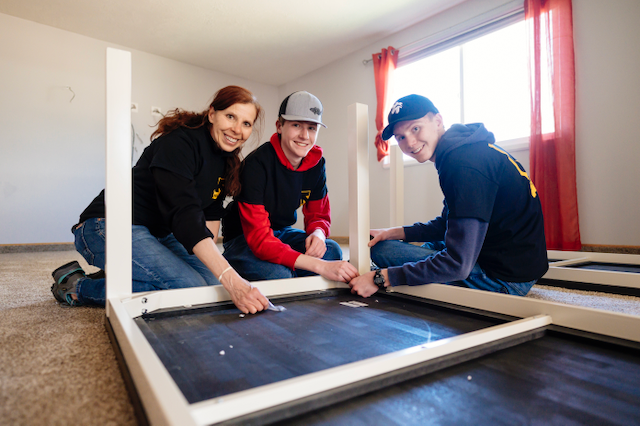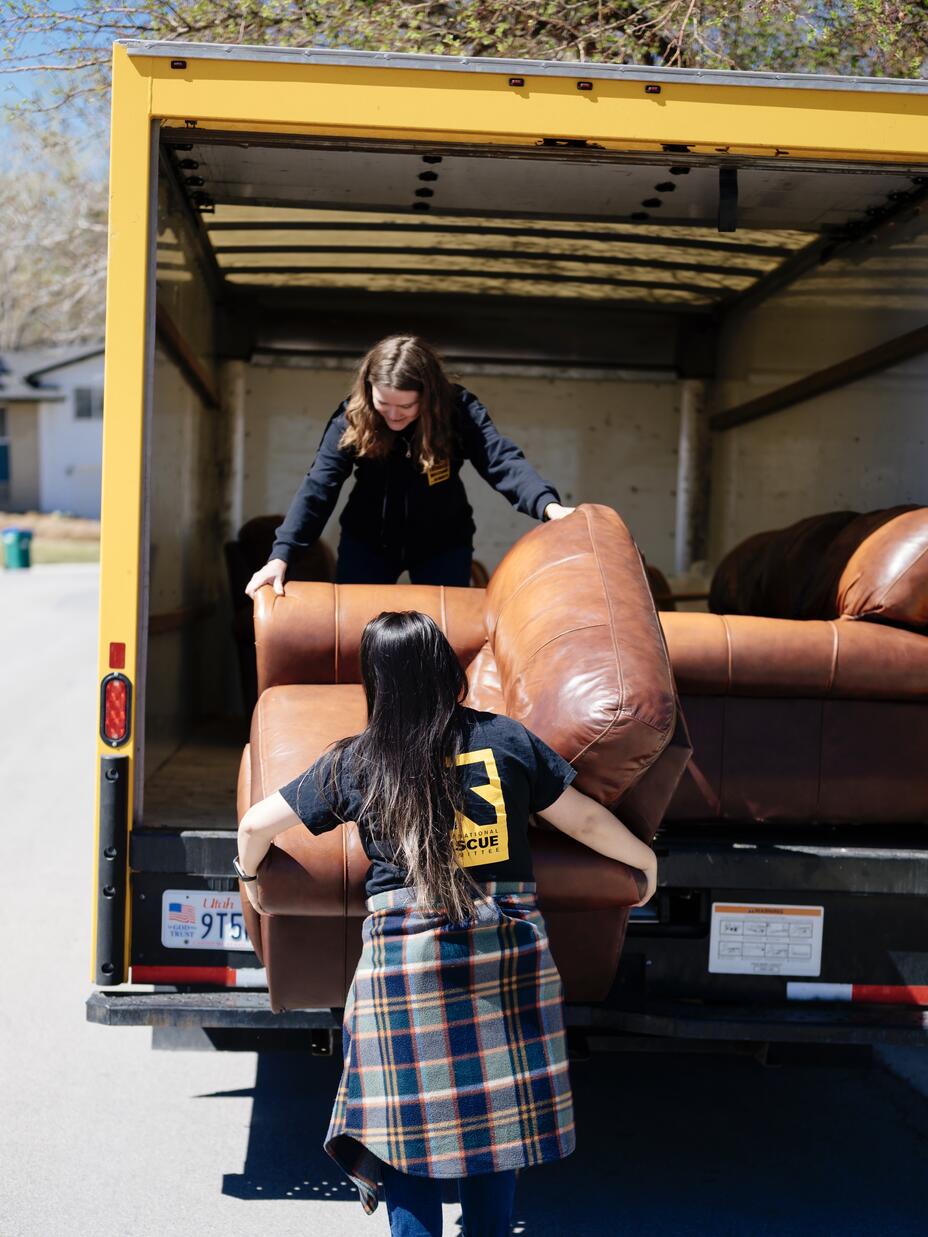From moving couches up multiple flights of stairs to ensuring a home is furnished for a family of up to ten, housing support volunteers increase the International Rescue Committee (IRC) in Salt Lake City's capacity to help newly arrived refugee families settle into permanent housing. This vital volunteer support comes at a time when the IRC in Salt Lake City has welcomed over 600 Afghan evacuees to Utah while supporting the resettlement of hundreds of other refugees locally.
Grace Cole, housing logistics assistant, coordinates and completes home setups with the support of a variety of community volunteers—including through a partnership with Lifting Hands International—to ensure household supplies, and home furnishings are set up for a family arriving at their first permanent home in the U.S. “We could not do what we do without volunteers. For every move we do, most often we have at least a few volunteers helping us with every step of the day,” said Grace. This includes loading housing supplies, moving couches and beds, setting up furniture, organizing supplies in the home, and much more.
Housing Support Volunteers are immediately rewarded for their efforts, seeing an empty apartment or house become a home as a product of their time. Often, flexible, volunteers are able to sign up when they are available, usually once a week during weekdays to lend a helping hand. Oftentimes, it’s an opportunity for the entire family to get involved—if family members can help move furniture! Jill, a dedicated housing support volunteer, asked her two sons to join her during their recent Spring Break.

“Housing volunteers are the backbone of our team. It is a great time where you get to meet people and do meaningful work together,” said Grace. Find out more about our housing volunteer requirements through our featured student story below:
Guest Contributor, Mary Ryan, from the University of Utah:
Housing Volunteers Needed: Patience, Flexibility, and Vaccines Required
As hundreds of Afghan refugees arrive in Utah, more and more homes are being furnished and staged by IRC Housing Support Volunteers. They move furniture from trucks into living rooms, place dishes and pans in cupboards, and arrange paintings and knickknacks to create a welcoming home environment for the new residents. There is only one thing that volunteers are instructed not to bring into these spaces: COVID-19.
The term “vulnerable population” has become more commonplace during the coronavirus pandemic. Although the phrase usually triggers an association with medically compromised individuals, persons whose agency is compromised or who have been displaced from their homes also fall into the category. According to the CDC, Afghan refugees arriving in the United States who occupy multiple subgroups of vulnerable populations face increased health risks during the coronavirus pandemic. In addition to establishing a new life in a foreign environment, refugees and other new Americans must also navigate an unfamiliar medical system and try to find healthcare information in a language they can comprehend. To mitigate some of the risks associated with resettlement, Afghan refugees are required to undergo medical screenings and a round of preventative vaccinations before arriving in the United States. One of these injections is the COVID-19 vaccine.

The IRC’s commitment to providing safety and security to vulnerable populations has remained unchanged by the pandemic, which is why volunteers working directly with others or in housing set-up must be fully vaccinated against Covid-19. The requirement stems from the IRC’s comprehensive COVID-19 response plan released in 2020, which committed to containing the spread of the virus by protecting sensitive communities through infection prevention and control. By shifting most volunteer work online in 2020, the IRC protected its workers and the families they serve. Now with the added protection of the Covid-19 vaccine, they are able to maintain the safety of families and volunteers as in-person resettlement work returns.
Unvaccinated individuals interested in volunteering with the IRC can still contribute to the resettlement of our new neighbors in other ways. A number of virtual volunteer opportunities are still available on the IRC website. Online Youth Tutors conduct virtual tutoring sessions for refugee high school students through Zoom and Facebook Messenger and offer support in specific subjects like math, science, and reading. Virtual Small Business Mentors with experience in business ownership, legal work, or accounting can contribute to local economic health by helping refugees maintain and grow their small businesses. And individuals fluent in Dari, Pashto, Russian, Ukrainian, or Spanish can volunteer from home as Interpretation Supporters using video conferencing apps to translate for IRC employees and clients. These and other remote volunteer opportunities are available on the IRC’s website.
For the IRC, COVID-19 is simply one more challenge to overcome in order to protect the communities they serve. Requiring volunteers to work closely with staff and clients to provide proof of vaccination ensures that their mission isn’t compromised, but remote volunteer work is just as essential to that cause. Perhaps IRC Vice President Bob Kitchen best epitomized this sentiment in his 2020 response to the pandemic: “Our 13,000-plus workforce of in-country staff will be the front line of our response. These brave people are committed to engaging the communities we serve. In the midst of fighting COVID-19, they are keeping our lifesaving programs afloat.”
For more information about in-person and virtual volunteer opportunities available at the IRC in Salt Lake City, please visit Rescue.org/VolunteerSLC.